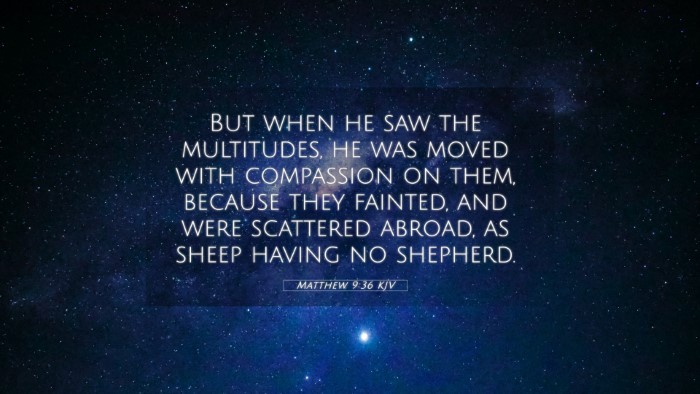Meaning and Interpretation of Matthew 9:36
Matthew 9:36 states, "But when he saw the multitudes, he was moved with compassion on them, because they fainted, and were scattered abroad, as sheep having no shepherd." This verse captures a profound moment in the ministry of Jesus, showcasing His deep compassion for the people. Various commentaries provide insights into its meaning and implications.
Understanding the Compassion of Jesus
According to Matthew Henry, this verse reflects the sorrowful state of the people at that time. They were like sheep without a shepherd, indicating a lack of guidance, protection, and care. Jesus' compassion was not merely emotional; it stemmed from His recognition of their spiritual needs and their vulnerability to false teachings.
Albert Barnes emphasizes the protective aspect of shepherding. In many Old Testament passages, leaders are referred to as shepherds. Barnes points out that the people’s disorganization and despair were because they lacked proper spiritual leadership, which Jesus felt deeply. He understood that without guidance, the people would perish.
Adam Clarke provides additional context, suggesting that the multitude represented not just immediate physical needs, but a broader spiritual hunger. Clarke highlights the contrast between Jesus’ compassion and the indifference often shown by the religious leaders of the time. This moment demonstrates Jesus as the true shepherd, who cared genuinely for His flock.
Cross-References for Matthew 9:36
To further comprehend Matthew 9:36, one can explore several cross-references that highlight the thematic connections within the scripture:
- John 10:14-15 - "I am the good shepherd, and know my sheep, and am known of mine." This verse speaks directly to Jesus' role as the ultimate shepherd.
- Psalms 23:1 - "The Lord is my shepherd; I shall not want." This well-known verse outlines the comforting nature of the Lord as a shepherd.
- Ezekiel 34:5-6 - "And they were scattered, because there is no shepherd: and they became meat to all the beasts of the field." This illustrates the dire consequences of lacking a shepherd, which parallels Jesus' observations.
- Matthew 11:28 - "Come unto me, all ye that labour and are heavy laden, and I will give you rest." This call for the weary highlights the compassion of Jesus as one who provides solace.
- Luke 19:41-44 - Jesus weeping over Jerusalem shows His compassion for a lost city, reflecting the same themes of concern for spiritual wellbeing.
- Mark 6:34 - When Jesus saw the multitude, He had compassion on them because they were as sheep not having a shepherd, reinforcing the sentiment found in Matthew 9:36.
- Isaiah 40:11 - "He shall feed his flock like a shepherd: he shall gather the lambs with his arm." This prophetic verse points to the caring nature of God and foreshadows Jesus’ ministry.
Thematic Bible Verse Connections
The concept of Jesus as a compassionate leader emerges not only in Matthew 9:36 but also in other passages that emphasize His mission to seek and save the lost. These verses provide a clearer picture of the interconnectedness of Jesus' works and character throughout the Gospels.
Tools for Bible Cross-Referencing can aid in studying these connections. A Bible concordance is particularly beneficial for identifying related verses that echo similar themes of compassion, guidance, and protection.
Comparative Bible Verse Analysis
Exploring the connections between Matthew 9:36 and other scriptures provides a richer understanding of Jesus' role. Cross-reference Bible study methods can help uncover the layers of meaning and the consistency of the message throughout scripture.
How to Use Bible Cross-References
By utilizing a cross-reference Bible study guide, one can effectively find verses related to Matthew 9:36, identifying the intricate web of Biblical themes that speak to God's compassion for humanity. Techniques in cross-referencing can enhance one's insights and deepen one's understanding of how various scriptures inform and illuminate each other.
Conclusion
Matthew 9:36 serves as a poignant reminder of Jesus’ deep compassion for the lost and the vulnerable. Through the lens of the commentaries and the cross-references provided, it is clear that understanding these connections enhances one’s grasp of scripture. This verse invites believers to reflect on the role of Jesus as the shepherd and encourages a compassionate response in their own lives towards others.


















